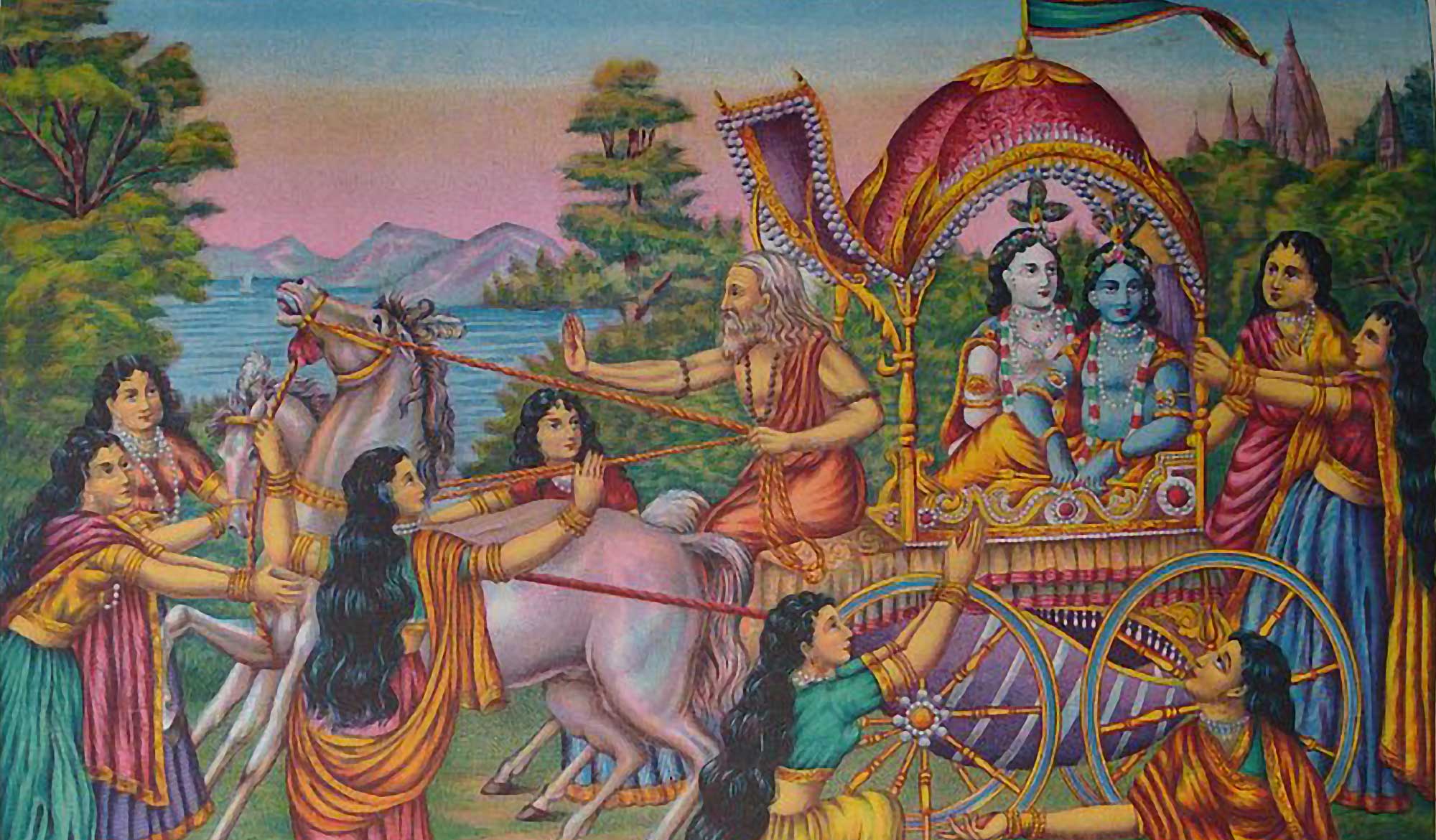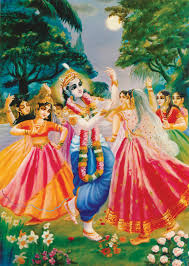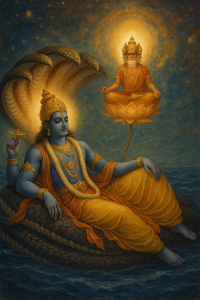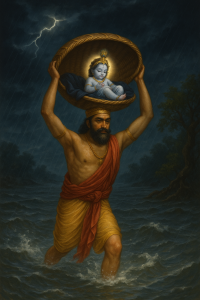Kaṁsa’s Final Plot
The evil ruler Kaṁsa of Mathurā was now filled with unbearable fear. All his demons had been slain—Pūtanā, Aghāsura, Tṛṇāvarta, Ariṣṭāsura, Keśī—and yet the boy Kṛṣṇa thrived in Vṛndāvana, loved and worshiped by all. He knew it was only a matter of time before the prophecy came true: “The eighth son of Devakī shall kill you.”
So Kaṁsa devised a new plan. He declared a Dhanur-yajña, a festival of strength and wrestling, and invited the entire region. His true intention: to lure Kṛṣṇa and Balarāma to Mathurā and have them killed by his wrestlers, Cāṇūra and Muṣṭika, or by the elephant Kuvalayāpīḍa.
But he needed a messenger. So he summoned Akrūra, his cousin and a noble-hearted devotee of Lord Viṣṇu.
Akrūra’s Divine Mission
Kaṁsa said to him:
“Go to Gokula. Invite Kṛṣṇa and Balarāma on my behalf to attend the Dhanur-yajña. Bring them here in your chariot. Tell Nanda Mahārāja that the King desires tribute and respects their presence.”
Though Akrūra accepted the task outwardly, inwardly his heart rejoiced. “At last I shall behold the Lord face to face,” he thought. He was a great devotee who longed to see Kṛṣṇa and Balarāma. His journey was not merely one of politics—it was the beginning of a divine reunion.
Akrūra’s Journey to Vṛndāvana
As Akrūra traveled toward Vraja, his heart overflowed with excitement and spiritual joy. He meditated constantly on the lotus feet of the Lord and wondered how he would greet Him. He said to himself:
“Today my life becomes successful. Today I will see the lotus-eyed Kṛṣṇa, the friend of the devotees. What is the use of eyes that have never beheld His beautiful form?”
As he approached Gokula, the landscape changed. The air carried the fragrance of cow dung, fresh butter, and blooming flowers. Cows lowed gently. Gopas and gopīs sang Kṛṣṇa’s glories. Akrūra’s eyes welled with tears as he realized he had entered the most sacred land on earth.
Meeting Kṛṣṇa and Balarāma
When Akrūra arrived at Nanda’s residence, Kṛṣṇa and Balarāma welcomed him warmly, offering him water, a seat, and respectful hospitality. Kṛṣṇa smiled, as if knowing everything, and Akrūra, though trembling with devotion, composed himself and delivered Kaṁsa’s message.
Nanda and the elders agreed to attend the festival and offer tribute. Kṛṣṇa and Balarāma would accompany Akrūra to Mathurā.
That night, the news spread. The gopīs wept silently. The cows mooed with distress. The trees seemed to bend in sadness. Even the birds stopped singing.
The Departure
The next morning, the chariot stood ready. Kṛṣṇa, holding a whip, climbed in joyfully with Balarāma. The villagers gathered to see them off, but their hearts were breaking.
The gopīs, especially Śrīmatī Rādhārāṇī, stood like statues, unable to speak. Their eyes followed Kṛṣṇa as He disappeared down the path, and their lives felt empty in a moment.
As the chariot moved away, dust from the wheels rose like a cloud of pain. The Vrajavāsīs cried out:
“Will our Kṛṣṇa return? Will we ever hear His flute again?”
Akrūra’s Vision in the Yamunā
On the way, Akrūra stopped at the Yamunā to perform his midday bath. When he dipped into the sacred water, he saw a divine vision: Kṛṣṇa and Balarāma standing within the water in their majestic, four-armed forms, worshiped by all the devas and sages.
He came out, looked at the chariot—and saw them seated there too.
“Are they inside or outside? Or both?” he wondered.
His faith deepened. He knew now without a doubt: Kṛṣṇa is not an ordinary child—He is the eternal Lord of all beings.
Lessons to Be Learned:
- The Lord accepts even political arrangements to fulfill divine plans and uplift His devotees.
- A devotee’s journey becomes sacred when it’s centered on seeing and serving the Lord.
- Kṛṣṇa responds to the love of His devotees, even when He seems to leave them.
- The gopīs’ mood of separation reveals the highest form of prema, where love deepens in absence.
- The Lord reveals His divine nature only to those whose hearts are filled with surrender and longing.
Origin of the Story: Harivaṁśa Purāṇa – Viṣṇu-parva, Chapters 71–74



